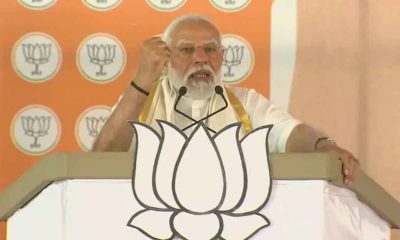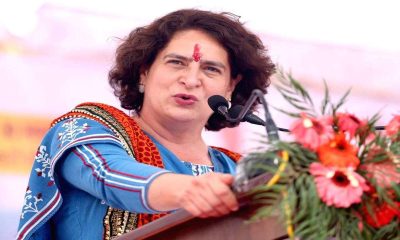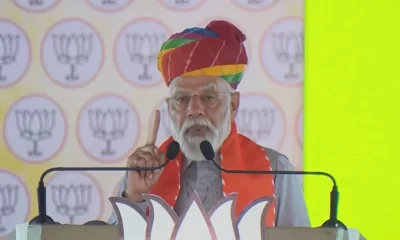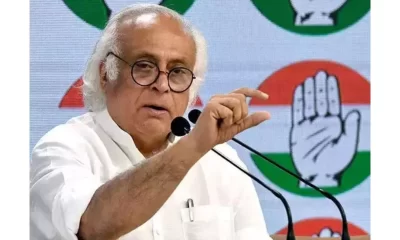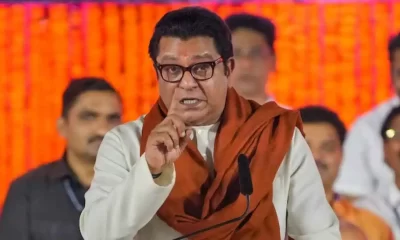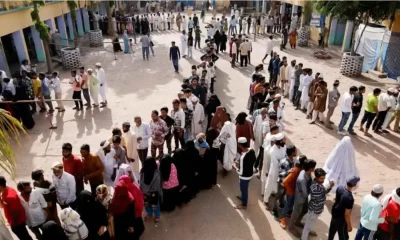Latest world news
Since Burqa Has No Quranic Injunction, Why Annoy Host Societies?
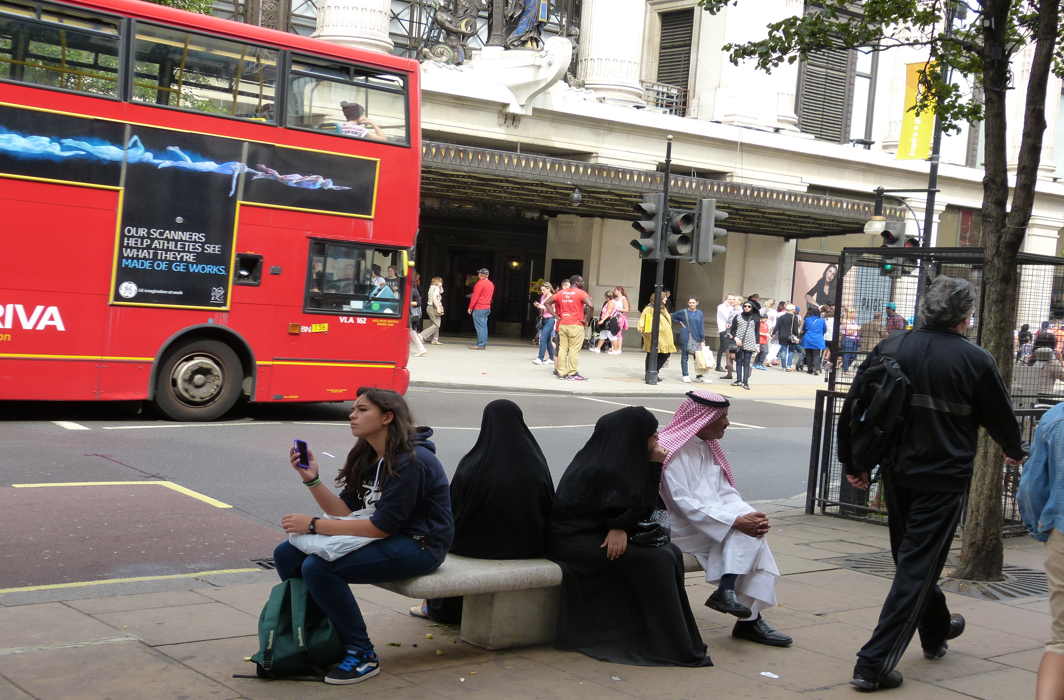
~By Saeed Naqvi
In normal times Britain’s former Foreign Secretary, Boris Johnson’s observation that burqa clad women resemble walking “letter boxes” and “bank robbers” would evoke laughter. But these are not normal times.
Just when liberals were beginning to pelt stones at him, a startling turn to the debate was given by Taj Hargay, Imam of Oxford. “The burqa is a Wahabi fifth column……we will wake up in the Islamic Republic of Britain.”
Johnson’s observation is mischievous, and has a political purpose, the Imam’s an exaggeration. The observations are troubling for an Indian Muslim. I would avoid being judgemental on a community which has been under immense pressure because of rampaging Islamophobia since the 90s. And yet, I cannot help asking: is the burqa a response to nasty Islamophobia or a means of aggravating it?
Aggravation of the problem is surely not our purpose. Then whose purpose is served by Muslim women floating around Oxford Circus in gear which distances them, in geometrical progression, from the host population? The clerics, eager to consolidate their congregations? Wouldn’t it be wonderful if these congregations had in their midst scholars, doctors, writers, scientists, entrepreneurs, rather than pliant women fitting Boris Johnson’s description.
I am troubled for another reason. After extensive travel around the world, I am inclined to cast my vote in recent years for Britain as a society where Human Rights, Rule of Law, Race relations are most secure. That is why I am uneasy at the two observations.
Let me turn to India to bring out my point, by comparison, in bolder relief.
The depths to which Hindu-Muslim relations have sunk in India is attributed by pundits to the brazenly communal politics of the ruling BJP under Prime Minister, Narendra Modi since 2014. If an ancient civilization, embracing 1.25 billion people can be so totally transformed in merely four years, Modi and his cohorts deserve to be celebrated as miracle men. No, the present government has clearly accelerated the communal agenda but the ground for it was diligently laid over 71 years of independence. The ruling party for most of these decades was the Congress.
Social disharmony was built into the manner in which Partition was affected. The Congress was firmly opposed to the two-nation theory enunciated by Mohammad Ali Jinnah, founder of Pakistan – that Hindus and Muslims constituted two separate nations. But the Congress accepted Lord Mountbatten’s June 3, 1947 plan for Partition in double quick time.
Maulana Abul Kalam Azad, former President of the Congress and others warned Pandit Nehru that Partition would mean “unadulterated Hindu Raj”.
By that logic once the Congress Working Committee had accepted a Muslim state, with a small Hindu minority, named Pakistan, it logically followed that the rest of India would be Hindustan or a Hindu state with a substantial Muslim minority. In other words, on August 15, 1947 India glided seamlessly from British Raj to Hindu Raj but Nehru chose not to use the term “Hindu” for a variety of reasons. A “Hindu” state was an affront to his self image. Self image was important to Nehru. In his evolution, there was a phase when he was angry with his father for having hired an English governess for his sister, Vijaylakshmi Pandit. “Bhai (brother) was cross” Mrs. Pandit told me, “because British aristocracy those days preferred French governesses.”
The basic reason why Nehru avoided the term “Hindu” to describe the new found state was Kashmir. How could a Hindu state claim the Muslim majority province of Kashmir on the principle of contiguity?
Look at it from the hard core Hindu perspective. After a thousand years of Muslim rule, 200 of British, the Muslim state of Pakistan does come into being. But, alas, no Hindu state. The sophistry of why it is so, is lost on the millions. This is where the Hindu communalist pitches his tent.
It turns out that, over the decades, a compulsive hatred for Pakistan has emerged an acid test for nationalism. Into this bubbling cauldron has been pushed a boulder – the post 9/11 war against terror. The Islamophobia this has generated globally has been grist to the Hindu communalist’s mill too.
I have argued in my book “Being The Other: The Muslim in India” that calling a spade a spade at the very outset would have minimized the social disharmony that has plagued us for 71 years. From day one we should have declared ourselves a Hindu state. This would have obviated the need for an unsettling, double distilled Hindu Rashtra or Hindu Nation. The Hindu in this “raj” would have been at the steering wheel but the minorities would have struck a stronger bargain for education, seats in Parliament, jobs in the cabinet, Civil Service, Police, Armed Forces and so on.
Detractors raise a howl of protest. How can a theoretic state be secular?
In the recent elections in Pakistan three Hindus, Mahesh Malani, Hari Ram Kishwari Lal and Giyan Chand Essrani, won from general seats in Sind – one for the National Assembly and two for the Provincial Assembly.
The fact that Britain is a Protestant monarchy did not come in the way of Sadiq Khan serving as London’s high profile Mayor. Last year Donald Trump banned travel to the US from several Muslim countries. He was therefore not accorded a “state” visit to Britain because in that event protocol would have involved the Mayor of London. Saving Sadiq Khan this embarrassment was important enough for the organizers to deny Trump a state banquet with the Queen.
The Home Secretary Sajid Javid may not be a practicing Muslim but he is there high in public profile to make a bid for the top job. Two years ago when I watched a test match there were four Muslims in the English cricket team. I have met doctors, teachers, civil servants, entrepreneurs from the sub continent, both Hindus and Muslims, thriving. The Anglican Church never came in their way. In India’s circumstances in 1947, a Hindu India may have been better, than the one cloaked in a hollow and bogus secularism where the police watch on as one Muslim (or Dalit) after another is lynched, some to the accompaniment of expert photography.
Latest world news
Bigg Boss 14 contestant Rahul Vaidya struggles walking in knee deep water, compares Dubai rains with Mumbai floods
Singer and TV personality Rahul Vaidya was recently stranded in the Dubai rains.

Rahul Vaidya, who was in Dubai ahead of his show which was scheduled to take place today, left the country due to heavy rains and reached Kolkata. The artist shared on social media his encounters in the UAE city, including challenges like walking through knee-deep water. Rahul provided an update regarding the heavy rainfall in Dubai on his Instagram profile.
The Bigg Boss 14 contestant revealed that he was in Kolkata and prepared to do an evening performance. Recalling the terrifying period he went through, Vaidya said there was a lot of confusion and panic in Dubai. The situation was similar to that when heavy floods hit Mumbai in 2005.
Vaiday also posted seval other images and videos of cars that were underwater and flooded roadways. The Bigg Boss 14 contestant, who shared his ordeal, claimed that even though it had just rained for two hours, the situation was dire.
In one of the video, which went viral he can be seen struggling in walking in knee-deep water. He can be also seen holding his sneakers in one hand and with other hand he was seen managing other things.
This is the result of the two hours of rain that it had, he can be heard saying in the video. Vidya also said he dosen’t believe Dubai is accustomed to a lot of rain. Everything had stopped working, he remarked.
After taking part in the first season of the singing reality show Indian Idol, Rahul Vaidya gained widespread recognition. In addition to Bigg Boss, he took part in Khatron Ke Khiladi 11.
Meanwhile, heavy rains that triggered flooding in the UAE and Bahrain, which left 18 people dead in Oman on Sunday and Monday, have paralyzed the financial hub of the Middle East, Dubai.
A lot of incoming flights were diverted from Dubai’s international airport because of the rain. At 7:26 p.m., the busiest airport in the world for foreign visitors stopped accepting new arrivals; a gradual resumption was announced for more than two hours later.
Images of planes navigating flooded tarmacs are making the rounds on social media.
According to pictures shared on social media, the flagship malls Dubai Mall and Mall of the Emirates both experienced heavy floods, while at least one Dubai Metro station had water up to the ankles.
There were several road collapses, severe flooding in residential areas, and numerous reports of leaks from windows, doors, and roofs.
Due to the unfavourable weather, schools around the United Arab Emirates were forced to close, and as more storms are predicted, the closures are anticipated to last until Wednesday. The government of Dubai allowed its staff to work remotely till this Wednesday.
Latest world news
Dubai sky turns green during storm in UAE, video goes viral
The UAE witnessed record-breaking rainfall on Tuesday and the National Centre of Meteorology recorded 254 mm of rainfall in less than 24 hrs in the Khatm Al Shakla area in Al Ain.

1 person was killed in UAE as it witnessed heavy rainfall on Tuesday, stranding commuters, flooding roads, disrupting trains and flights and resulting in water leakage from mall ceilings. The UAE witnessed record-breaking rainfall on Tuesday and the National Centre of Meteorology recorded 254 mm of rainfall in less than 24 hrs in the Khatm Al Shakla area in Al Ain. It is being said that the rainfall was the highest documented since the start of data collection in 1949.
The heavy rainfall in UAE came days after a similar situation in neighbouring Oman, where 13 people were killed in flash floods. Many parts of Oman saw torrential rains, which caused students to be trapped in buses and swept away motorists and trapped people in their homes.
Videos from Dubai circulating on social media showed widespread waterlogging on roads in Abu Dhabi, Dubai and other important cities. This left daily commuters in cars and other vehicles struggling to get back home. Dubai metro station too was seen flooded and closed.
One such video circulating on social media shows the aerial view of the city of Dubai from the top of a building. In the video the stormy winds are seen blowing over the city of Dubai. As the storm intensifies the Dubai sky turns green and ultimately gets covered by heavy rainfall. The video has gone viral on social media with more than 1.1 million views.
Another video showed water leakage from the ceilings of shopping malls, flooding the floors and destroying goods. A video which was shot in the famous Mall of the Emirates, showed pieces of ceiling falling as the rainwater gushed inside. Videos from many outlets of the Deira City Centre mall chain showed escalators being rendered unusable. Majid Al Futtaim, the company which owns the Mall of Emirates, said that the shopping complexes have been kept open and the customers are being sent away from the flooded areas.
India News
Sri Lankan Minister Douglas Devananda says statements on reclaiming Katchatheevu island from Sri Lanka have no ground
Devananda told the media on Thursday that it is not unusual to hear such claims and counterclaims about Katchatheevu as elections are taking place in India.
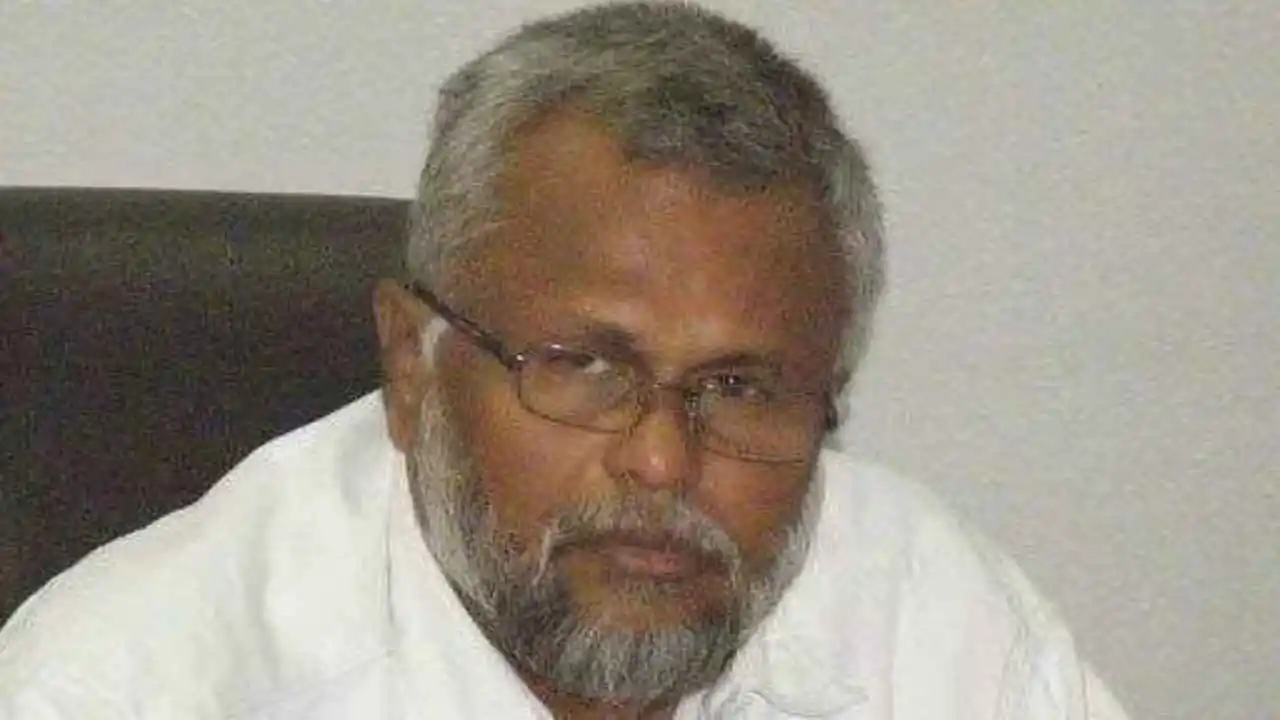
Sri Lankan Minister Douglas Devananda has said the statements from some political leaders in India on reclaiming Katchatheevu from the island nation have no ground. He told the media on Thursday that it is not unusual to hear such claims and counterclaims about the strategic island as elections are taking place in India.
The Sri Lankan Minister said he thought India is acting on its interests to secure this place to ensure Sri Lankan fishermen would not have any access to that area and that Sri Lanka should not claim any rights in that resourceful area. According to the 1974 agreement, Devananda said Indian and Sri Lankan fishermen can go fishing in the territorial waters of both countries until the pact was reviewed and amended in 1976.
The amended agreement resulted in fishermen from both countries being barred from fishing in neighboring waters. India’s ministry of External Affairs (MEA) on Thursday steered clear of the row surrounding Katchatheevu island. To a volley of questions on the Katchatheevu issue, MEA spokesperson Randhir Jaiswal reffered to External affairs Minister S Jaishankar’s recent comments on the matter.
He said he would like to talk about the issue that has been raised. He added the External Affairs minister has spoken to the press here in Delhi and also in Gujarat and has clarified all the issues. He said everyone should look into the press engagements and they would find the answers to their questions there.
The remarks from Devananda, a Sri Lankan Tamil, came days after the Narendra Modi government accused the Congress and its ally DMK in Tamil Nadu of overlooking national interests by handing over Katchatheevu island to Sri Lanka in 1974. The BJP has also been slamming the 2 parties for not ensuring the rights of the fishermen wanting to fish in waters around the island.
-
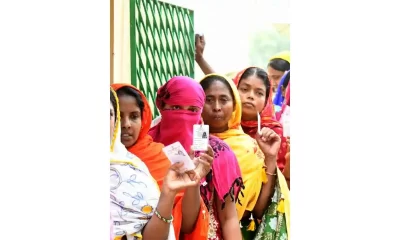
 2024 Lok Sabha Elections23 hours ago
2024 Lok Sabha Elections23 hours agoPrime Minister Narendra Modi urges citizens to vote in record numbers as voting for first phase of Lok Sabha elections begins on 102 seats across India
-

 Entertainment18 hours ago
Entertainment18 hours agoDo Aur Do Pyaar social media review: Social media users say Vidya Balan, Pratik Gandhi deliver standout performances in this adorable film
-
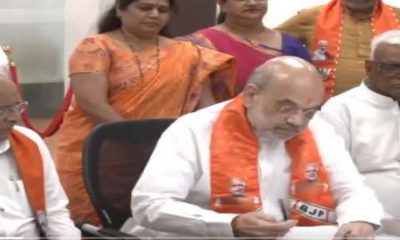
 2024 Lok Sabha Elections19 hours ago
2024 Lok Sabha Elections19 hours agoLok Sabha elections 2024: Amit Shah files nomination from Gandhinagar
-

 Entertainment20 hours ago
Entertainment20 hours agoYami Gautam starrer Article 370 releases on Netflix today
-
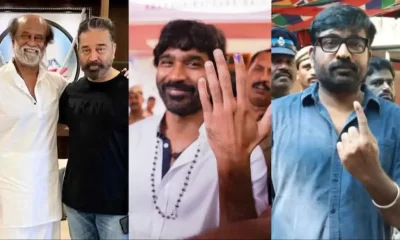
 2024 Lok Sabha Elections22 hours ago
2024 Lok Sabha Elections22 hours agoKamal Haasan, Rajinikanth, Vijay Sethupathi, Dhanush vote in Chennai
-
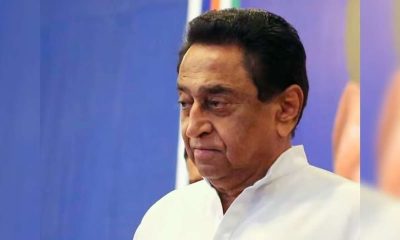
 2024 Lok Sabha Elections15 hours ago
2024 Lok Sabha Elections15 hours agoDeserted by key supporters, the Kamal Nath story looks set to wind to an end in Chhindwara
-
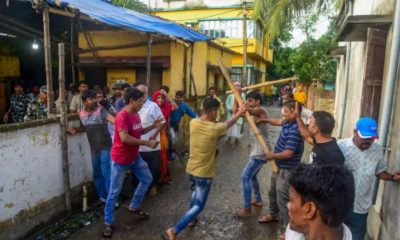
 2024 Lok Sabha Elections21 hours ago
2024 Lok Sabha Elections21 hours agoLok Sabha elections 2024: TMC, BJP workers clash in West Bengal’s Cooh Behar ahead of voting
-

 Entertainment17 hours ago
Entertainment17 hours agoAditya Roy Kapur, Sara Ali Khan’s Metro In Dino to release this November


